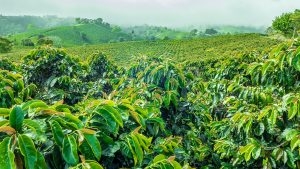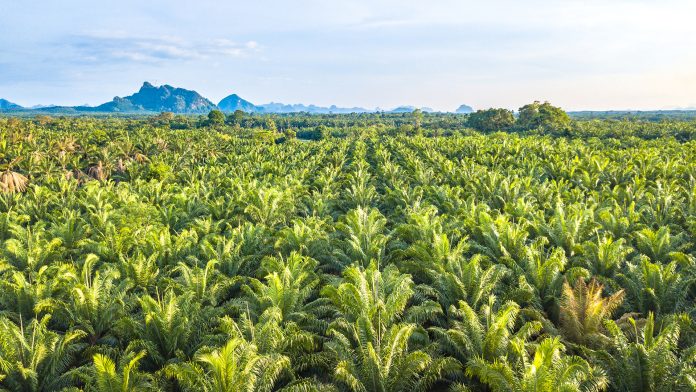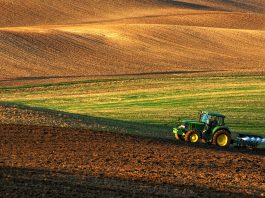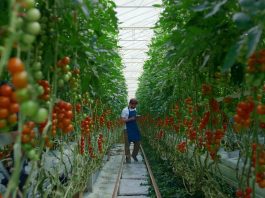Helmholtz Centre for Environmental Research has found that EU agricultural trade policies should be renegotiated globally to establish sustainable food systems.
The cultivation of soya, palm oil, coffee, cocoa, sugar, or hazelnuts in their countries of origin outside Europe is sustainable in only a minority of instances.
For example, rainforests are cleared, and valuable grasslands are used for palm oil and cocoa plantations. As well as this, harmful pesticides are used in the cultivation of cocoa and hazelnuts.
The EU has expressed its share of responsibility for preventing negative consequences for biodiversity and the climate.
It is committed to the principle of Policy Coherence for Development. Accordingly, the EU wants to achieve the UN Sustainable Development Goals within the EU and support developing countries in implementing them.
In the EU Green Deal and the Farm to Fork Strategy, the EU Commission has committed to promoting the transformation towards sustainable food systems.
Now, the research team is proposing a new approach to navigating the complex agricultural trade policies between the EU and exporting countries. The approach analyses the relevance and leverage effect of individual imported foods for the EU and country of origin.
Establishing the importance of trade for each agricultural product
The research team’s new approach uses the ‘relevance’ criterion to describe the proportion of an agricultural product from a country of origin in total imports into the EU.
The ‘leverage’ criterion established by the team describes how important the proportion of an agricultural product imported into the EU is for the country of origin in the overall value chain or agricultural production.
Dr Yves Zinngrebe, UFZ environmental policy expert and lead author of the research, said: “We can thus describe the importance of trade with the EU for each agricultural product and exporting country and consider measures that could make these trade relations more sustainable.”
The team analysed the relevance and leverage effect of the most important agricultural imports for three dimensions: the economic value that these imports have for the country of origin, the footprint as a measure of land consumption for the cultivation of the imported goods, and the deforestation required for the production of imported goods.
Soya, palm oil, cocoa, and coffee account for over 80% of the land deforested for the cultivation of EU products
The researchers found that soya, palm oil, cocoa, and coffee are responsible for over 80% of the land deforested for EU product cultivation.

They also discovered that much of the EU’s influence is focused on a few groups of countries with specific export profiles. These include the MERCOSUR countries of Argentina, Brazil, Paraguay, and Uruguay in particular, because trade with these countries (especially in soya) accounts for 22% of the trade value, 33% of the required land area, and 40% of the imported deforestation.
These are joined by Malaysia, Indonesia, and Papua New Guinea, which specialise in palm oil cultivation, and some countries in Africa, Latin America, and Vietnam, which specialise in cocoa and coffee.
“The EU could achieve a great deal if it focused on soya, palm oil, coffee, and cocoa when establishing sustainable trade relations,” said Zinngrebe.
Greater sustainability in global food systems
The EU holds significant influence in certain small sugar-producing nations like Mauritius, Fiji, Barbados, and the Bahamas.
Although their overall significance to the EU is minimal, the proportion of land dedicated to EU exports is notably high (20–40%), underscoring the EU’s potential responsibility in establishing sustainability standards. This leverage is also considerable for Eastern European countries such as Ukraine and Russia, as well as Central Asian nations like Kazakhstan, which supply large quantities of grains to the EU.
Crops such as wheat, maize, barley, sunflowers, rapeseed, and linseed from these regions constitute nearly 70% of the imported footprint.
“If the EU hopes to ensure greater sustainability in global food systems, it should use its relationships primarily with trading partners for which the leverage is particularly high,” said Professor Sebastian Lakner, agricultural economist at the University of Rostock and final author of the study.
“The aim here is to develop new agricultural standards or regulations together with our trading partners, which provide benefits to both the countries of origin and the countries of consumption.”
The role of EU supply chain law
The EU’s supply chain law is important in enhancing the transparency of the production conditions of traded goods, including the extent of deforestation or previous land usage.
It is imperative for the EU to reduce the impact of highly significant agricultural products like soya and palm oil, which contribute significantly to deforestation in partner countries.
This could involve regulating demand by promoting sustainable livestock farming or adopting a low-meat diet.
EU has lost some of its influence
However, past experiences, such as with palm oil, highlight the delicate nature of global trade.
Despite efforts to enforce sustainable cultivation, the EU faced market share losses as other countries like India and China gained prominence in the global market.
“The EU thus gambled away parts of its influence because the demand for palm oil continues. It no longer has as much influence on making this trade more sustainable because the proportion of palm oil imported into the EU is no longer as high,” said Zinngrebe.
This means that the EU no longer holds as much leverage.
If the EU wants to implement policy coherence globally, it must support countries in developing sustainable food production systems.









